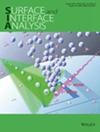铈的光电子能谱:还原、定量和XPS分析中空位峰的神话
IF 1.8
4区 化学
Q4 CHEMISTRY, PHYSICAL
引用次数: 4
摘要
主要由于其固有的氧化还原化学性质,二氧化铈(CeO2)在许多不同的研究领域得到了应用。然而,在讨论CeO2晶格的损伤或还原的结果时,对氧谱有大量的误解,特别是关于该区域归因于氧空位的信号。本文表明,该峰不可能是由空位引起的,并且当与o1s信号串联考虑时,最好从Ce(III)组分的化学计量变化中更好地理解CeO2的化学计量变化。本文章由计算机程序翻译,如有差异,请以英文原文为准。
Photoelectron spectroscopy of ceria: Reduction, quantification and the myth of the vacancy peak in XPS analysis
Primarily due to its inherent redox chemistry, ceria (CeO2) is of use in many diverse areas of research. However, there is a wealth of misinterpretation of the oxygen spectra when discussing the result of damage or reduction to the CeO2 lattice, especially with regard to a signal in this region attributed to oxygen vacancies. In this paper, it is shown that this peak cannot be due to vacancies and that a better understanding of the changes in stoichiometry of CeO2 is best viewed from that of the Ce(III) component when considered in tandem with the O 1s signal.
求助全文
通过发布文献求助,成功后即可免费获取论文全文。
去求助
来源期刊

Surface and Interface Analysis
化学-物理化学
CiteScore
3.30
自引率
5.90%
发文量
130
审稿时长
4.4 months
期刊介绍:
Surface and Interface Analysis is devoted to the publication of papers dealing with the development and application of techniques for the characterization of surfaces, interfaces and thin films. Papers dealing with standardization and quantification are particularly welcome, and also those which deal with the application of these techniques to industrial problems. Papers dealing with the purely theoretical aspects of the technique will also be considered. Review articles will be published; prior consultation with one of the Editors is advised in these cases. Papers must clearly be of scientific value in the field and will be submitted to two independent referees. Contributions must be in English and must not have been published elsewhere, and authors must agree not to communicate the same material for publication to any other journal. Authors are invited to submit their papers for publication to John Watts (UK only), Jose Sanz (Rest of Europe), John T. Grant (all non-European countries, except Japan) or R. Shimizu (Japan only).
 求助内容:
求助内容: 应助结果提醒方式:
应助结果提醒方式:


